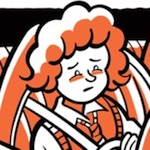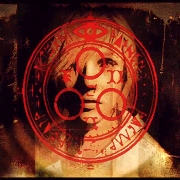|
Currently reading Caesar’s Gallic Wars. It’s really good but he’s definitely inflating these troop numbers.
|
|
|
|

|
| # ? Apr 27, 2024 09:03 |
|
Laurenz posted:Currently reading Caesar’s Gallic Wars. What? No...
|
|
|
|
Every word Caesar ever wrote was 100% true.
|
|
|
|
Is there a definitive, digestible volume on repairing the world after WWII? I'm thinking more along the lines of how things were physically rebuilt, economic activity picked back up, people fed, etc. than an academic critique of the Marshall Plan.
|
|
|
|
I'm just going to copy/paste a post I made (possibly in the wrong thread) in the SA Book Club! Current: Book Review January! thread. Figured it fits better in here. This one is maybe not entirely fitting since it is just a rough draft, but our good old forums poster Bulletsponge13 has been absolutely spoiling us with his memoirs from Iraq. The man writes in a way that feels more like painting masterpieces that putting letters on a page. Since the forums probably won't let me upload about 130mb of pdf, I'll have to settle for a link to his thread. If any of you feel like being swept away to the most immersive description of what it is like to a US soldier in Iraq, you owe it to yourselves to click this link. https://forums.somethingawful.com/showthread.php?threadid=4002076&pagenumber=1 If a book title is necessary in order to count, you have two title options. Death Wears Duckie Pajamas. Or Often kind, but mostly stupid.
|
|
|
|
I’m sure this is a common question, but what are some good books for background reading to Shakespeare’s history plays? For someone who knows nothing about the history other than how it is presented in those plays.
|
|
|
|
Bandiet posted:I’m sure this is a common question, but what are some good books for background reading to Shakespeare’s history plays? For someone who knows nothing about the history other than how it is presented in those plays. Which plays specifically? Also, have you looked for any annotated editions for the plays you want to read?
|
|
|
|
Bandiet posted:I’m sure this is a common question, but what are some good books for background reading to Shakespeare’s history plays? For someone who knows nothing about the history other than how it is presented in those plays. Shakespeare's Roman plays are basically plagiarized from Plutarch, so those might be a good pairing (with the addendum that a lot of Plutarch's stuff is biased or incomplete, but still probably a good start).
|
|
|
|
The non-Roman ones are basically taken from Holinshed's Chronicles. But I think what Bandiet was asking for was a book about the actual history of the Wars of the Roses, etc., not Holinshed's version.
|
|
|
|
Shakespeare's Kings by John Julius Norwich is basically that book. It's not super in depth, but it's an easy to read overview for people who don't know much English history. Not a bad first stop to make you decide if you want to read more about particular periods.
|
|
|
|
Lewd Mangabey posted:Shakespeare's Kings by John Julius Norwich is basically that book. It's not super in depth, but it's an easy to read overview for people who don't know much English history. Not a bad first stop to make you decide if you want to read more about particular periods. Thanks, this is probably where I should start. I was referring to the English history plays specifically, and I’ve read most of them before, but wanted to revisit them with some kind of real knowledge of the period.
|
|
|
|
Reminds me to finally read The Plantagenets this year
|
|
|
|
|
Bandiet posted:I’m sure this is a common question, but what are some good books for background reading to Shakespeare’s history plays? For someone who knows nothing about the history other than how it is presented in those plays. Brainworm is an English prof and Shakespeare expert and has a thread in A/T, as another good place to look.
|
|
|
|
Anyone read Lieberman's Strange Parallels? It's a 2 part series with the first focusing purely on Southeast Asia (then author is a S.E. Asia specialist) and then the second being basically a global history 'of the periphery' to act as comparison. I'm wondering how necessary it is to read the first if I'm mostly interested in the second? It's apparently one of the best done broad comparative history books out there which I'm always down for. Speaking of, after putting it down for like a year I finally finished John Darwin's After Tamerlane: The Rise and Fall of Global Empires, 1400-2000, which is another comparative history focusing on major Eurasian empires, addressing them region by region. I thought it was pretty good, but a lot better in the second half when he starts to focus on European imperialism which is clearly his specialty (he's a historian of the 20th century Briitish Empire). Lieberman's work is by all accounts uncannily well researched for each of the regions he highlights and offers a bit of a different perspective which I'm kind of excited about. Apparently very convincing arguments to support a 'late-great divergence' idea -- that a lot of things we commonly cite as European exceptionalism had parallels throughout Eurasia -- which I'm keen to take in since to be honest I've been finding myself drifting to be more at the opposite stance than I used to be. If anyone has recommendations for other non-pop-history grand comparative histories I'm all ears. I know they naturally run into the issue that it's impossible to be an expert in everything, but having spent the past decade as a hobbyist nose deep in East Asian studies the insularism of so much nationally focused history has been grinding my gears to no end. Koramei fucked around with this message at 11:38 on Feb 2, 2024 |
|
|
|
Picked up After Tamerlame and it's quite good so far.
|
|
|
|
Has anyone read Weavers, Scribes and Kings by Amanda Podany? It's been very readable but informative, definitely the best book covering ancient Mesopotamia that I've ever read. She also appears to be an academic historian so certainly the research feels sound. The book receives my solid recommendation if nothing else. Is the Durant couple's Story of Civilization still the best attempt to cover most of human history in a widely accessible format? I read the first two books when I was younger and always meant to continue but they were not the kind of reading I could easily commit to in university
|
|
|
|
I read more than a hundred pages of a book about the Crimean War before it occurred to me that that conflict is eerily relevant to the present day.
|
|
|
|
FPyat posted:I read more than a hundred pages of a book about the Crimean War before it occurred to me that that conflict is eerily relevant to the present day. I've always wondered, what was the Crimean War?
|
|
|
|
Gripweed posted:I've always wondered, what was the Crimean War? The really short version is: essentially a great power squabble over influence in the Ottoman Empire, with the Russian Empire trying to assert its influence and Britain and France opposing them because they liked having the Ottomans act as a barrier against Russian expansion towards the Mediterranean. The war was fought around the Black Sea and Crimea became the focal point because then as now it was Russia's major naval base in the region.
|
|
|
|
vyelkin posted:The really short version is: essentially a great power squabble over influence in the Ottoman Empire, with the Russian Empire trying to assert its influence and Britain and France opposing them because they liked having the Ottomans act as a barrier against Russian expansion towards the Mediterranean. The war was fought around the Black Sea and Crimea became the focal point because then as now it was Russia's major naval base in the region. The other thing I'll add is that it's part of a chain of twelve wars between Russia and the Ottomans that stretched from the 16th century into the 20th. Alongside that you have a ton of side-conflicts as various groups try to take advantage of the situation, especially local independence movements. This is in large part how most of modern SE Europe gets its independence, many of them in the 1870s. This is also a large part of the explanation for why the Russian Empire historically took so much interest in SE Europe, e.g. their support for Serbian nationalists in the run up to WW1. The Crimean War is one of the only ones that the Ottomans came out on top of, in large part due to the English and French intervention.
|
|
|
|
The book points out among the Western reasons for siding against Russia the (quaint-seeming in a post-9/11 world) belief among Turkophiles that Islam was a more civilized and enlightened faith than Orthodoxy. In France, this was spurred on by the fact that Russia engaged in more anti-Catholic repression (against the Poles) than the Ottomans did.
|
|
|
|
The Crimean War was also the first war with telegraphic dispatches keeping the public at home informed on the events on a daily basis. This led to a lot of public pressure on the military and government, but also to the introduction of censorship. It was also one of the first photographed wars and a test bed for many technologies to be used in the Civil War and onwards.
|
|
|
|
My favorite revelation about the Crimean War is that it featured the famous charge of the Light Brigade. At the time, and still today, perceived as an example of a military blundering and pointless loss of life. While it was the result of military miscommunication and infighting, it was in actuality a costly, but very successful charge against a numerically superior force and did exactly what cavalry was supposed to do on the battlefield (e.g. drive enemy cavalry from the field). It just didn't lead to a battlefield victory or major shift in the strategic situation and was therefore perceived by the public to be a defeat and military blunder. This lead to it being mythologized as such and is still cited today as an example of a "doomed charge". Personally, just found it revealing about how we teach and learn from history and how sometimes facts don't really matter and it's more about how certain events are perceived and mythologized.
|
|
|
|
The casualties they took were severe but i was surprised to discover that it wasn’t an 80-90% loss. That said, the book doesn’t do much to avoid giving the impression that Lord Raglan was one of Britain’s worst military leaders ever.
|
|
|
|
Tosk posted:Has anyone read Weavers, Scribes and Kings by Amanda Podany? It's been very readable but informative, definitely the best book covering ancient Mesopotamia that I've ever read. She also appears to be an academic historian so certainly the research feels sound. The book receives my solid recommendation if nothing else. I’m about 40% through and it’s really great on the “deepest possible dive into individual lives in snapshots” thing but feel it suffers, for obvious reasons, at the larger arc of the history involved. Wouldn’t recommend it to someone who knows nothing at all about ancient Mesopotamian general history but if you’re decently grounded in that already it’s a pretty stellar read.
|
|
|
|
Reading Neil Price's "Children of Ash and Elm," survey of Viking history, about halfway through. The first part of the book is more a loose collection of sociological essays, one chapter per subject, and I'm just getting into the "history proper" with the start of the 8th c. raids. Interesting stuff so far: -He suggests that the environmental disasters of the 6th c., which killed a large portion of northern Europe's population, motivate the idea of Fimbulwinter and color the apocalyptic tenor of Norse myth, but says there's no real way to prove this. -The English almost certainly had contact with the Vikings prior to the raids, but were shocked at their apparently inexplicable turn to looting and violence in Western Europe. -The Vikings regularly participated in human sacrifice and ritual rape, and probably brutally killed people (usually through blunt trauma) to act as "secondary burials," or people thrown in graves alongside the dead bodies of important people. He says Ibn Fadlan's account of the gory boat burial (involving the ritual rape and murder of a slave woman) in the Rus is probably largely accurate, which if true makes it one of the most hosed up things ever described. -Viking graves have inexplicably idiosyncratic stuff thrown into them. No one knows what there Vikings did with the majority of the ashes of cremated bodies, all of which weren't interred in crematory burials. -Viking halls had insignias associated with them. These were impressed onto small plates and placed on the walls of other halls when one visited them, like trading cards or business cards. -Viking "sea-king" culture violently displaced an earlier more representative political form that survived more intact in Iceland. The author suggests the "sea kings" have cultural analogies to age-of-exploration pirates and gangsters. -The Vikings were probably hot, given that foreigners always seemed impressed by their looks on meeting them. -Despite being literate, the Vikings have no long-form texts of their own from within the Viking period itself (as opposed to from the later high medieval recollections of that period). -The switch to the "Viking age" is characterized as simultaneously a mercantile revolution in NW-ern Europe and an explosion of a violent military culture now "pointed outward" that was first honed internally in Scandinavia.
|
|
|
|
Nerdburger_Jansen posted:-The Vikings were probably hot, given that foreigners always seemed impressed by their looks on meeting them. I’ve been to Scandinavia, this checks out.
|
|
|
|
After learning of an uncle’s execution at the hands of South Korean intelligence, I feel that I owe it to my great-grandparents as a Korean to learn more about the Korean War, and yet I have to admit that it’s one those subjects that I find it difficult to work up enthusiasm for learning about, faced with a depressing and sordid time period that will likely leave me angrier and more cynical. It’s a similar thing that makes it hard for me to pick up books on the darker parts of African-American history.
|
|
|
|
Bruce Cumings' book is good but as you've anticipated it's not light reading.
|
|
|
|
FPyat posted:I read more than a hundred pages of a book about the Crimean War before it occurred to me that that conflict is eerily relevant to the present day. what was the book?
|
|
|
|
Nerdburger_Jansen posted:Reading Neil Price's "Children of Ash and Elm," survey of Viking history, about halfway through. The first part of the book is more a loose collection of sociological essays, one chapter per subject, and I'm just getting into the "history proper" with the start of the 8th c. raids. i recently read this Aelfred's Britain: War and Peace in the Viking Age by Max Adams. It tells a very british history of the Anglo-Saxons and the viking invasions. Obviously the famous british chroniclers were literate and being monks had a very subjective view of the various Danish, Norwegian and Irish viking but there are contemporary sources, as you say, than just didn't exist in scandenavia
|
|
|
|
branedotorg posted:what was the book? The Crimean War by Orlando Figes, usual caveats about his ridiculous behavior apply.
|
|
|
|
Tosk posted:Is the Durant couple's Story of Civilization still the best attempt to cover most of human history in a widely accessible format? I read the first two books when I was younger and always meant to continue but they were not the kind of reading I could easily commit to in university It's easy to criticise the Durants, but I don't think "most of human history" is an accessible subject at all; there's just too much stuff. Better to read a bunch of different things than a single attempt. Weavers, Scribes, and Kings sounds cool.
|
|
|
|
You can do lots with "all of human history" but you need a very specific angle. Like the Smil book about the total biomass of the Earth during the history of Homo sapiens
|
|
|
|
Would anyone be able to recommend a biography of Theodore Roosevelt?
|
|
|
Foreskin Problems posted:Would anyone be able to recommend a biography of Theodore Roosevelt? The three volume one by Edmund Morris. Starts with Theodore Rising. Excellent if a bit hagiographic.
|
|
|
|
|
Ras Het posted:You can do lots with "all of human history" but you need a very specific angle. Like the Smil book about the total biomass of the Earth during the history of Homo sapiens That book is so cool
|
|
|
|
Nerdburger_Jansen posted:Reading Neil Price's "Children of Ash and Elm," survey of Viking history, about halfway through. The first part of the book is more a loose collection of sociological essays, one chapter per subject, and I'm just getting into the "history proper" with the start of the 8th c. raids. Sounds fascinating honestly.
|
|
|
|
Ras Het posted:You can do lots with "all of human history" but you need a very specific angle. Like the Smil book about the total biomass of the Earth during the history of Homo sapiens That does sound cool, but it's not all of history any more than your height and weight are all of you.
|
|
|
|

|
| # ? Apr 27, 2024 09:03 |
|
I'm reading books in halves, because I have a hard time finishing them all in one go, so before getting back to the Vikings I read the first half of Eckart Frahm's "Assyria: The Rise and Fall of the World's First Empire." The book mostly focuses on the late kings of the "neo-Assyrian empire." The stuff before that is an impenetrable swirl of names and dates and peoples. Some interesting things: -Ashur was originally a merchant city with little interest in warfare, which for mysterious reasons reinvented itself as a land empire engaged in perpetual warfare on its peripheries, with a divine mandate to expand its territory. -The Assyrians were "Babylonia-boos," obsessed with the culture of their older southern neighbor. There was a very weird love-hate thing going on there, with the northern and southern states being ascendant at different times. -"God-napping" was a favorite strategy in Assyrian warfare (or maybe this was just everywhere in the Near East?) – the ultimate humiliation was to take the statues of foreign nations' gods, which seems to have been a stand-in somehow for taking the god itself(?) -The characteristic art-style associated with Assyria (winged bulls and so on) is apparently a fairly late invention of the neo-Assyrian empire, and arose in a fairly short span of time. -The Assyrian kings and army are portrayed as almost charmingly parochial when they had to face foreign territories on campaign in settings very distinct from their homeland – they had descriptions of deserts and mountains written in pretty colorful language, and seemed bewildered by them and frustrated at how they were an obstacle for the movements of the armies. The Assyrians also never really mastered seafaring, being a true contiguous land empire to the end. -For some reason, Frahm is fixated on the idea of Assyria as the "first empire." I don't really understand this claim, and he only devotes a couple of pages to talking about what he takes an empire to be and why the other obvious candidates don't count. I don't really understand from this book why the Akkadian "empire" is not the better first candidate. -Apparently, poo poo hit the fan when Sargon II died on campaign in modern-day Turkey and his body couldn't be recovered to be buried. His new capital was left abandoned, and his son and grandson seemed to in turn try to erase his memory and then publicly acknowledge his shameful death as the result of displeasing the Assyrian gods. -Sennacherib was apparently mentally unwell, so that he was described as possessed by a demon – it reminds me of the portrayals of Saul and Nebuchadnezzar. -Frahm describes the "siege" of Jerusalem in 701 BC by Sennacherib's forces as the first "world event," unique in history up to that time for the number of nations involved (he represents it as a kind of clash between the two "world powers" of Egypt and Assyria, with Judah caught in the middle as the final prize in the western Levant), and unique for being described in the historical records by three distinct civilizations: The Judeans, in the books of Isaiah, 2 Kings, and 2 Chronicles; the Assyrians, in a number of royal inscriptions (and artworks depicting the siege of Lachish beforehand); and the Greeks, through Herodotus. -The Assyrians were masters of deportation and relocation of their conquered enemies. From the way it's described it seems like they did the equivalent of the Trail of Tears regularly. Apparently there are historians who try to claim the deportations weren't so bad, but I think you'd have to be on crack to believe that. -The Assyrians in the latter years kept relocating the capital, and building newer and larger cities to act as the imperial center, with Nineveh being the last. A sign of decadence? Overall, I find this stuff pretty unpleasant – it's probably because all the sources deal primarily with warfare, plague, dispossession of foreign enemies, etc. I don't think you can get an interesting picture of what life was like in these places from these sorts of sources, and from their royal inscriptions, the kings of Assyria seem insane. I certainly could never be an "Assyria-boo."
|
|
|












 \
\





























